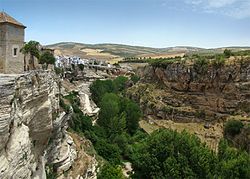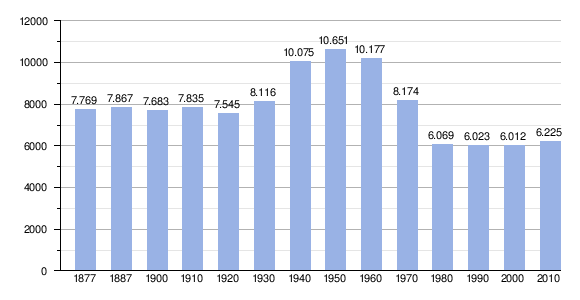Alhama de Granada: Difference between revisions
m →top: clean up; http→https for Google Books using AWB |
JJMC89 bot (talk | contribs) Migrate {{Infobox settlement}} coordinates parameters to {{Coord}}, see Wikipedia:Coordinates in infoboxes |
||
| Line 28: | Line 28: | ||
| seat_type = |
| seat_type = |
||
| seat = |
| seat = |
||
| coordinates = {{coord|37|00|N|3|59|W|region:ES_type:city|display=inline,title}} |
|||
| latd = 37|latm = 00|lats = |latNS = N |
|||
| longd= 3|longm = 59|longs= |longEW= W |
|||
| coordinates_type = region:ES_type:city |
|||
| coordinates_display = inline,title |
|||
| coordinates_footnotes = |
| coordinates_footnotes = |
||
| elevation_m = 895 |
| elevation_m = 895 |
||
Revision as of 14:13, 6 March 2017
This article needs additional citations for verification. (December 2010) |
Alhama de Granada | |
|---|---|
 View over the gorge of Río Alhama | |
 | |
| Coordinates: 37°00′N 3°59′W / 37.000°N 3.983°W | |
| Country | |
| Autonomous community | Andalusia |
| Province | Granada |
| Comarca | Alhama |
| Government | |
| • Alcalde | Jesús Ubiña Olmos (2015) (PP) |
| Area | |
• Total | 433 km2 (167 sq mi) |
| Elevation | 895 m (2,936 ft) |
| Population (2008) | |
• Total | 6,035 |
| • Density | 14/km2 (36/sq mi) |
| Demonym(s) | Alhameño, -ña; jameño, -ña |
| Time zone | UTC+1 (CET) |
| • Summer (DST) | UTC+2 (CEST) |
| Postal code | 18120 |
| Website | Official website |
Alhama de Granada is a town in the province of Granada, approx. 50 km from the city of Granada. The name is derived from the thermal baths located there, which are called الـحَـمّـة al-hammah in Arabic.
In 1482, the fortress town was taken from the Moorish Sultanate and Kingdom of Granada by the Catholic Monarchs.
Alhama’s position between Málaga and Granada gave it strategic importance for the Moors but they also had a particular fondness for the town and its thermal waters. The cry of sorrow, ¡Ay de mi Alhama!, uttered by Abu Al-Hacen following the battle of 1482 when the town was lost to the Catholic conquerors, entered the Spanish language as an exclamation of regret. The story of the fall of Alhama and the subsequent slaughter of its inhabitants by the Christian knights is referred to in Tariq Ali's, The Islam Quintet in the first book--"Shadows of the Pomegranate Tree" (ISBN 0860916766).
At a convenient distance from the town centre, nestling in a poplar grove lining down the banks of the river (also known as Merchan), you will find a hot springs. Prehistoric remains found in the neighbourhood show the antiquity of the human settlements.
There is also clear evidence of the way Romans used the waters. In the 15th century, the Arabs consolidated the town next to these hot springs and it was believed that they built the thermal baths there, but the real origin of those baths is Roman as is proved in the book by Salvador Raya Retamero, a local historian, in his book "Reseña histórica de los baños termales de la muy noble y leal ciudad de Alhama de Granada" (Brief history of the hot springs of the most noble and loyal city of Alhama de Granada).[1] A short interview with the author explains the details.[2] The strategic influence of Alhama de Granada made the fall, in 1492, of the Arab empire vital for the conquest of the Kingdom of Granada, which led to the beginning of a flourishing age, because of the patronage of the Catholic Monarchs. The bath house in the Almohade style of the 12th century that is preserved in the spa is a good example of Arab bath construction.
The magnificent horse shoe arcs were built over the remains of Roman construction and are covered by a vaulted roof, pierced by star-shaped openings that let the daylight filter in. Under the vaulted roof of the baths the oldest warm spring of Alhama de Granada bubbles up. The newest one, which springs up a few metres from the other, was discovered in 1884, many centuries after a terrible earthquake whose epicentre could have been very near the area.
Alhama de Granada looks out over some of Spain's most spectacular scenery. In winter, the view to the majestic snow-capped Sierra Nevada is uninterrupted. Alhama is situated not far from Arenas del Rey (about 14km away)which itself is situated on the edge of the vast Bermajales lake which is surrounded by woods of poplars and Mediterranean black pines. Constructed between 1947 and 1954 this reservoir with a hydro-electric plant at one end provides sandy beaches, safe swimming and plenty of non-motorised water sports. There are also a couple of cafes at the edge of the lake. Many of the local population spend evenings and weekends barbecuing at the water's edge; it is a great location.
There are a few bars in Alhama which serve "cafés" and "tostadas" in the morning, lunch in the late afternoon, and tapas in the evening. Casa Ochoa Tertulia Bar and Cafe Bar El Tigre are local favorites. For nightlife, El Encuentro plays more contemporary pop and reggae music, while Por Amor Al Arte has live flamenco on the weekends.

Demography

References
External links
- Alhama Accommodation Information on Alhama de Granada and the surrounding area.
- Alhama de Granada Portal Alhama de Granada, accommodation, restaurants, tourist routes in Alhama de Granada, or the monuments that make a city Alhama charm. Festive, carnival of Alhama de Granada.
- Alhama de Granada - Sistema de Información Multiterritorial de Andalucía
- Picture Gallery Photos of Alhama de Granada and surrounding countryside
- Cafes & Bars in Alhama Some of the bars, cafes, travel and festival information for Alhama de Granada, Andalucía, Spain
- Weather Weather averages in Alhama de Granada



